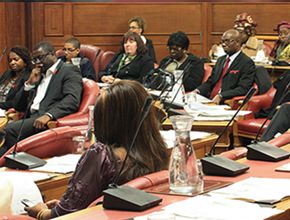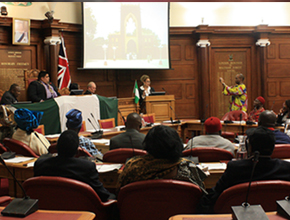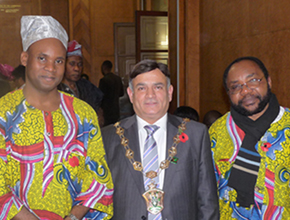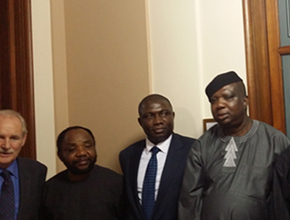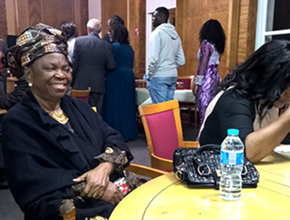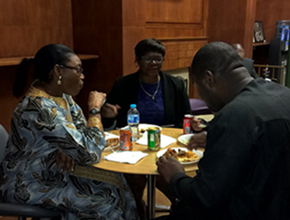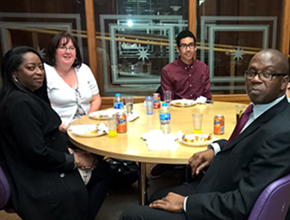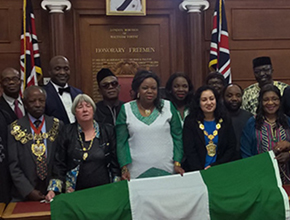What Is Custom?
Custom traces how a particular life, family, house, community, marriage, norms, place or thing was made. What most historians, etymologists, anthropologists have done is taking it from material culture and not from the root. True custom refreshes itself daily and anyone can try it to learn further. Igbo custom is integrated and padded together such that a careful person easily understands it with the supported reasons. Our ancestors treated both near and far neighbours alike e.g., they present kola nut alike. As you may know Igbo speaks in tongue; e.g., Igbo does not eat kola nut but use it receptively while securing trust and confidence; hence, offering, presentation and blessing of kola nut involve invocation of divine unity worthy to share the kola nut. The Almighty God (Chiukwu), former custodians (ancestors) and those present are put under oath or covenant of honesty.
This means that offering kola nut is not compulsory but whosoever shall offer it must do so with clean conscience and those to share it must also do so with clear conscience. Truly, if anyone offers kola nut with guilty conscience, he will enlarge judgment in his family. Thus, from that time onwards, death will repeat in his family until there is no one to offer kola nut. Similarly, if anyone shared kola nut with guilty conscience, he will be stressed out until the goodwill is remedied. Thus, kola nut is a divine tool for peace, trust and confidence among the Igbos. Whosoever corrupts it pays dearly for it (read more in the research). Kola nut is the first port of reception and can be kola nut, bitter nut, garden egg or what the host can comfortably afford. Kola nut may be eaten ordinarily but in certain occasions, it goes with wine. The wine is used in pouring libation. The commonest occasion, the two plays together is marriage.
Kola Nut:
The kola nut is the prime entrance to Igbo culture. Some people know and address it as receptive nut; yes, but it is more than that. The ancestors' concept of kola nut and palm wine dates back to the days of Kaine and Lemechi. Minus the recent disorganisation of the Igbos that started from 1441AD of the slave trade and compounded by colonialism from 1901AD, kola nut previously secured their unity. According to oral tradition, after Kaine and Lemechi killed, fear developed amid neighbours and they covenanted with kola nut and palm wine to end killing. Thus, whoever shared kola nut and palm wine and still turned evil has committed abomination. This is why our ancestors receive visitors with kola nut to create and build confidence. Charity is the beauty of the heart and kola nut is the expression of it. Check what Jesus did with bread and wine, he covenanted against evil as Igbos covenanted against killing; thus, the covenant survives (see publications).
Igbo Calender:
The Igbo calendar is unique in name and purpose; like the market days: Eke, Orie, Afor, Nkwo, the Igbo calendar revolves around Igbo activities. Thus, a scholar of Igbo calendar would not say a moon or month without identifying what happens in it. Thus, onwa mbu reminds of farm and can be said: onwa-olu.
Igbo calendar is calculated either in eight-day or seven-day week. Eight-day or izu-ukwu runs from orie-ukwu to orie-ukwu. Eight-day appointment includes the two ories. This is now only used in special events e.g., calculating Easter. The seven-day runs from orie-ukwu to Eke and is now used to collect periodic rent. However, it is for those making the appointment to determine their exact days.
- Olu (April): Igbo year opens with farming
- Ike (May): power and capability to work
- Ubi (June): farming
- Uge/unwu (July): scarcity/famine
- Oka (August): maize
- Ji (September): New yam festival
- Aja (October): mud prepared for erecting building
- Nye (November): harvest starts
- Ure (December): out from farm
- Uguru (January): Harmanttan
- Egwu (February): wrestling and entertainments
- Enyo (March): assessment for farming
Marriage
Marriage is the union of a man and a woman to the exclusion of others. However, before it gets to this level, a lot of rites go into it. Parents have married to get sons and daughters for marriage. Their only concern is respect; thus, honour and respect them to secure their consent and blessing. Remember, whatever stimulation that drove a child out unceremoniously repeats the experience of Adam and Adah, who disobeyed God.
Remember also when the ancestors started the custom; they were almost the only race that afforded palm wine. Further remember, it was a difficult thing to take a man's daughter; thus, the palm wine served an inducement; hence, a man wishing to marry for his son must befriend palm wine tappers and each time he goes to his in-law, he must go with palm wine to drug him. They drink together and share those ancient customs and when the man is drunk; his daughter is taken from him. When he wakes the following day and asked of his daughter, he was told: as you took another man's daughter, another man has taken your daughter. You can understand the ancient humour and the equity. The ceremonial order of taking and giving daughter/son is the highest order in Igboland. Marriage in Igboland is the longest unbroken relationship. The in-law from time to time visits and presents wine to refresh alliance. Marriage is the union of a man and a woman but the couple is never alone per se. They must join the community of the groom and share in community affairs (see research).
What does Igbo enweghi Eze mean?
How did the igbos come about the concept of kingship (Eze)? Has Aka-ji-ofo disappeared? Traditionally, Aka-ji-ofo produces Eze (King) and priest. It is a birthright: Ezechishiri. Igbo Eze was distorted and devalued by the slave trade from AD1441 to 1901, when they yielded to greed, corruption and untamed pride.
Was Igbo truly kingless or that it played to its detriment? Recently, the Igbos found their abuses belittling them; how did 2,000 clans or 20 districts operate peacefully without Police and Army? The Igbos once operated the most conscious democracy that networked communally but without central power. Igbo history may not be documented but documented histories echoed Igbo customs. Melchizedek was Aka-ji-Ofo and Aka-ji-Ofo produced King and Priest. Aka-ji-Ofo functions under sacred ordinances of divine sanctions. Has Igbo no Kings when there were Eze Ibeke, Unegbu, Ukaigwe, Nwautrikpo, Agugba, Akpada, Ezenri, Efba, Amanyinabo, Njemaze, Ezeukwu, Oraelosi, Orizu, Amaobi, etc?
The cause of the fife is abuse and greed since 1441, when the slave trade found Igbo leaders naked and many gave in to the corruption which diminished their value and caused enigmatic confusion in Igbo. When democratic Eze functioned, 2,000 clans culminating to 20 districts in 1908 networked against evil and killing. Remarkably, instead of coming together to combine after the slave trade, they scattered culminating to the present mushroom ward-ships, which broke Igbo down to the bone marrow. If it is possible to bribe Igbo Eze to accept less to betray Igbo, we shall look beyond. The emergency leadership of the late Ikemba did not do enough for Igbo because it lacked constitutional frame to stretch the Igbos. That the Igbos turned inward to cheat and maltreat inhumanely means that the civil war did not burn out their internal strives.
Igbo did not have refuge camp for the criminal; Igbo customs forbid certain acts called aru or abomination and communally, no clan accepted a criminal from another clan. Consequently, Igbo customs banished criminal. Woman is the greatest Igbo value after Chineke and anti-social act such as rape; murder, stealing from farm, poison, etc, were typical offences that led to banishment to the shrine. The whole ethics put sanity, good reasons and acts in places for social orderliness. Igbo was the first community with custom and social structure but greed devalued Igbo and relegated her to bottom. What was copied and promoted as democracy by many nations today is not as effective as the former Igbo democracy which tasked and stimulated everyone to contribute. Yet the current Igbo scholars, religious, practitioners, Aka-ji-ofo, etc, want to be determined by Rome of 845BC and Christianity of AD325 when Chi became known as God. The current Igbo situation depicts a head relegated to tail by fault. Consider Aka-ji-Ofo and its ethics, where else does it exist? Aka-ji-Ofo is most ancient of all customs. Remember after Kaine and Lemechi killings deflated morality, trust and confidence, our ancestors covenanted against killing until AD 1441, when it came back through the back door of the slave trade. When the head committed awfully and abominably he became the tail. Now, the youths (Edo, Yoruba and Hausa) are determining Igbo because Igbo provoked justice. When the head eats millipede, its scales plague him; when the youths try to swallow the elder, his tail stretches out from their mouth. This is where Nigeria is; with no truth, repentance and appreciation of each other, the future blinks. The Igbos are responsible and should redeem itself and others.
Scholars, religious and priestly pretend custom and prefer Eucharist but what Jesus did is very much reflected by kola nut and palm wine (Gen 14:18; Matt 26:24; The Igbos: The Afrikan Root of Nations; chap 5); meaning that whatever the Igbo admired in other cultures to abandon its own customs is against her.
In response to greed, the world attest racism but mistake highlights greed more, this is where Igbo is. When you hurt the custodian of peace, you get no joy but war is not good for the custodian of peace. It is in this scenario that the solution lies but who is to untwist its path? Is there a need to use inter ballistic missiles to deal with neighbours planted by God? What is the solution? It is with the Aka-ji-Ofo. It must be gradual and bottom-up in securing grassroot awareness of the consequence of evil proclivity. Covenant and sanctions are natural paths to justice. Legal justice yields mainly to civil matters but natural justice abide with equity which Ofo is its major tool. The foreigners (GT Basden, CK Meek, Fischer, Morel, Kingsley, etc) witnessed for the state of Igbo before confusion, why did the Igbos accept less? The worst embarrassment to Igbo is education; not that to read and write is bad but that mere education is not enough without customs. Said many times, what does Igbo enweghi Eze mean and what is its correction? The Europeans identify their problems and spend time to research their solutions, what is wrong with our methods? The Hausa and Yoruba may have acted against Igbo, what of the things Igbo did to itself? Kiths and kin in logger head endangered Igbo, could this be blamed on outsiders? Ugwo n'efu aku; what Igbo lost is like spitting up and lowering one's head to receive the spittle. As usual, the consequences will remain until the Igbos own up to change for better.
Communities look back to check when the dredging rain start to beat them; for the Igbos the most recent past is the slave trade and since then, Igbo has not been well. To be well does not depend on size or the alligator pepper would not be noticed. The point is: Igbo is everywhere and nowhere, what will it benefit Igbo to be everywhere and lost its mother tongue? Yet, it is not mother tongue because tongue is not a birth right as it can be learnt; what impacts on being well is discussing and agreeing on terms and conditions kiths and kin can live together. Our ancestors without university degrees sustained Igbo, what really is the proof of our education? If our ancestors sustained Igbo with covenants and sanction, can we do without covenants and sanction?
Naming Ceremony
The psychology of ripped apple is its eating. Whether deferred or done immediately, that expectation is never forgotten. To actually belong to the community of potency and posterity, the couple must perform to defend the root of life. Soon, the wine continues its journey to inform of the arrival of the child; as you can see, marriage brings unending relationship. No wander, the Igbos fight only such a person that messes up their daughter. It is ever guaranteed that whoever performed the full customary marriage rites shall never be barren. However, if it delays, the couple are investigated for remedial courses and the investigations involve both parties' parents. Nevertheless, the guarantee has not failed anyone (see research).
Farming
The value of land in Igbo is inestimable and hailed from omenala (custom). Igbo has no earth deity but has detailed customs of land. Apart from living on land; Igbos farm on land. Igbo farming season lasts between April and October and Igbo year runs from April to March. Igbos produce yam (ji), cocoyam (ede), cassava (jiakwu), beans, maize, and vegetables such as okoro, melon (nwanru given to egwusi), uha, pumpkin (anyu), fulted-pumpkin (ugu).
Igbo Dishes
Not at all defending one's mother's soup to be the best; truly, Igbo dishes (ugba, okoro, pepper soup, vegetable, melon (Egwusi), ogbolo (ogbono) soups, yam, etc, have no near challenges. No wonder our ancestors lived long because their diets were highly supportive of good health. All the struggles of Igbo end in producing continuing generation to sustain the dishes.
Death
Death challenges our memories because it is an end culture. Death is the end or opposite of life. Death comes when it will come and does not accept any consolation. By natural ordinance, the son shall bury the father and mark it as long as he wants. It is a bad omen for the son to die before the father. The Igbos celebrate death in marking the life lived; thus, the memories linger. Death has no standard and its customs differ.
